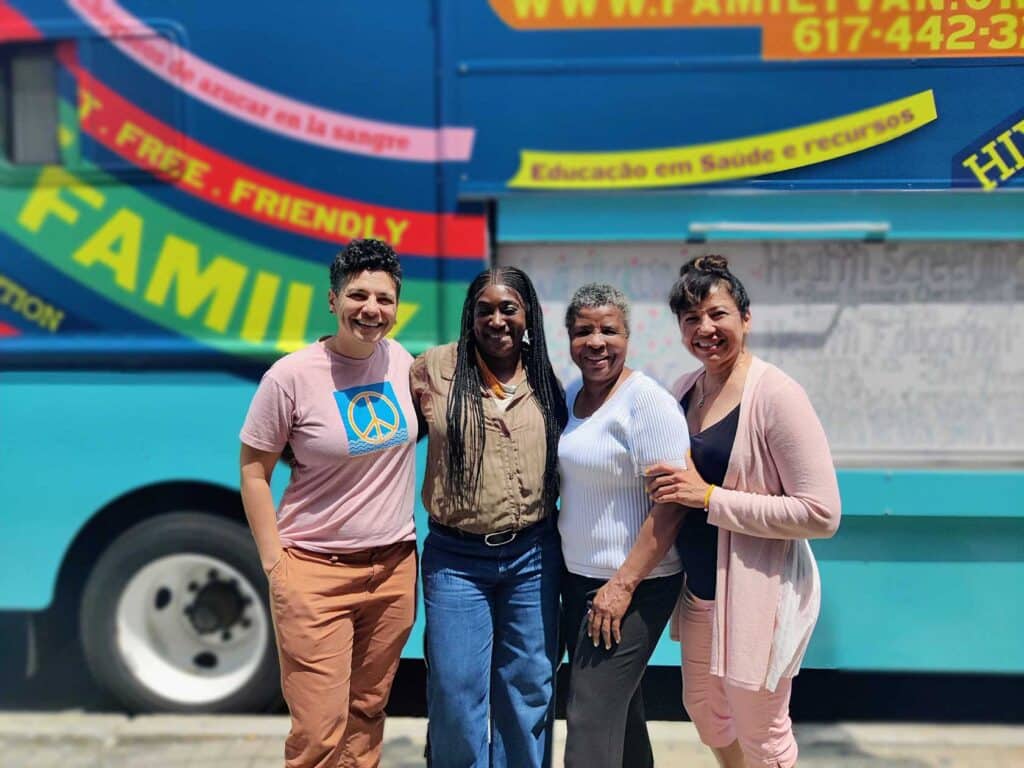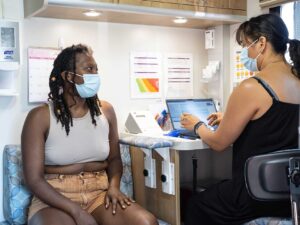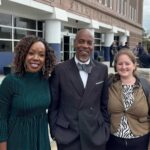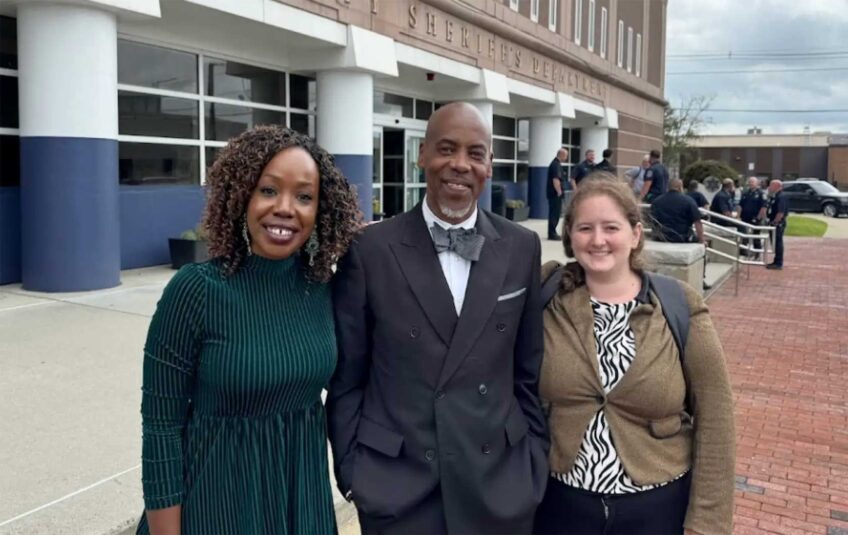The Family Van mobile clinic aims for head-to-toe wellness via its ‘Healthy Roads’ program

For community health workers and staff at The Family Van, a Boston-area mobile health clinic, there’s magic in connecting with community members to offer and something special in the simple questions like, “How are you?”
Through its program Healthy Roads, staff at the Family Van, which is associated with Harvard Medical School, is trying to bring that magic beyond just physical health and into mental health care as well.
“We always talk about wellness, because we want to see somebody well from the head to the toe. We think about the total health care of the individual that’s in front of us,” said Rainelle Walker-White, associate director health equity programs with The Family Van.
Launched in 2021, the Healthy Roads program uses Problem Management Plus, a curriculum developed by the World Health Organization, to teach coping strategies and problem-solving skills to reduce symptoms of anxiety and depression.
The program was featured at Boston Medical Center’s Sept. 12 health equity summit, EQTY 2024, as an innovative approach to providing care.
Through the program, six community health workers and more than 87 volunteers, medical students and interns at The Family Van offer clients five free sessions to learn skills to cope with and work through stressors, like breathing techniques, how to access social supports and how a client can move into action to manage their care.
According to its 2023 impact report, the group reported benefits like improved social connection, increased physical activity, better sleep and increased confidence and hope.
In developing it, Piper Derenoncourt, assistant director of mental health equity programs, said The Family Van aimed to really center the voices and needs of the communities they serve.
Listening to the community
For example, the WorId Health Organization’s original curriculum outlines 90-minute sessions, but in some of the initial conversations with communities the organization held to structure the program, Derenoncourt said they heard suggestions like 30 minutes every other week was more functional, and that they should be run by people from the community rather than social workers.
“We leaned into that, and we do lean into that,” she said. “There are times where it might be 15 minutes that someone has, and there are sessions that might run a little longer.”
That means that the work addresses some general stressors — like dissatisfaction at work or relationship issues or facing unemployment — but also others like struggling with language barriers or facing the challenges of the U.S. immigration system.
The Healthy Roads effort aims to change what mental health care and access to that care looks like.
“We must reimagine mental health care and expand our thinking about who, how and where care can be delivered,” said Mollie Williams, executive director of The Family Van at a presentation at BMC’s health equity summit. “That’s what we’re working towards, a city, really not just a city, a world, where everyone can thrive.”
A big part of that reimagining is bringing care beyond specialists like psychologists and psychiatrists to connect more people with the basics that can help them in their day-to-day lives.
“Not everyone needs [to talk to a psychiatrist or a psychologist],” Derenoncourt said. “How do we build out the community-level support where we’re not diagnosing, we’re focused on promoting well-being and helping people just talk about their mental well-being or connecting with each other.”
Meeting clients where they are
Staff at The Family Van said they think that the community health workers who help clients through the Healthy Roads program may be more approachable. They don’t wear lab coats and don’t offer session through a sterile hospital setting.
Instead, they often meet clients in the community, at a Dunkin’ or a library or on a park bench during the gap before a parent has to pick up their child. Clients can also opt to do their sessions on Zoom.
“For a community health worker to work with somebody around their mental health, I think that connection and that engagement is so much more empathetic, but at the same time, it’s comforting.” Walker-White said.
Derenoncourt said The Family Van has received feedback from clients who are also seeking services from a therapist revealing that they can talk more openly with their community health worker than with the mental health specialist.
“We get so caught up in metrics, how we can measure things and best practices and evidence-based, that sometimes we lose the magic that really is within healing, and that’s connecting with people,” Derenoncourt said.
That on-the-ground connection can help some clients who might struggle with the stigma around mental health care to be willing to access the services through the Healthy Roads program.
“The biggest thing that we’ve learned is that we don’t really have to promote it as mental health or well-being; that will automatically create barriers for people,” she said. “So, how are we talking about it in a way that people can relate and really see themselves?”
Instead, they often let it be a natural offshoot of conversations with clients about how they’re doing and what needs aren’t being met, said Dina Martinez, a community health worker with the van.
“We see [other challenges with well-being] as a way of communicating,” Martinez said. “‘I am under stress because I’m not sleeping,’ ‘I am under stress or depressed because I’m not eating well.’ There’s that listening piece. The client always communicates, ‘I’m not well’ in many, many forms.”
Reimagining care isn’t new for the group, which has been going out to provide care directly in communities for decades. The mobile clinic — which regularly provides free health screenings, education and community referrals — was first launched in 1992.
Small actions, big impact
In 2023, the group reported over 1,700 visits to the van and 3,000 preventive screenings to community members, according to its annual impact report. Those screenings were for physical health issues, including things like blood pressure, blood glucose, obesity and pregnancy, but also mental health topics like anxiety and depression.
And that impact overwhelmingly affected communities of color. The van focuses its efforts in Roxbury, Dorchester and East Boston with a rotating weekly schedule. The report indicated that 94% of the clients they worked with were people of color and over 50% primarily spoke a language other than English.
Helping to bridge language barriers can be an important step to reducing stressors. Martinez said one client she worked with at The Family Van didn’t speak English, so as part of helping him, they found him online language classes. Partway through the five sessions, he came back and asked to start doing the Healthy Roads meetings in English.
“That, to me, is a success, right?” Martinez said. “That the fact that he felt so much better about himself, so much more confident about seeking work and just communicating in life in the secondary language that he’s learning, that is really good. It’s a successful story for him and for us at the Van.”
Steps like that — non-traditional ones that can bring new types of care to the community — are some of the things staff at The Family Van point to as actions that can address equity disparities more generally.
“I believe that we can change these systems,” Williams said, during her presentation at the EQTY summit. “I believe that we can work together to ensure that people get the help they need and deserve so that everyone can live full, healthy lives.”







